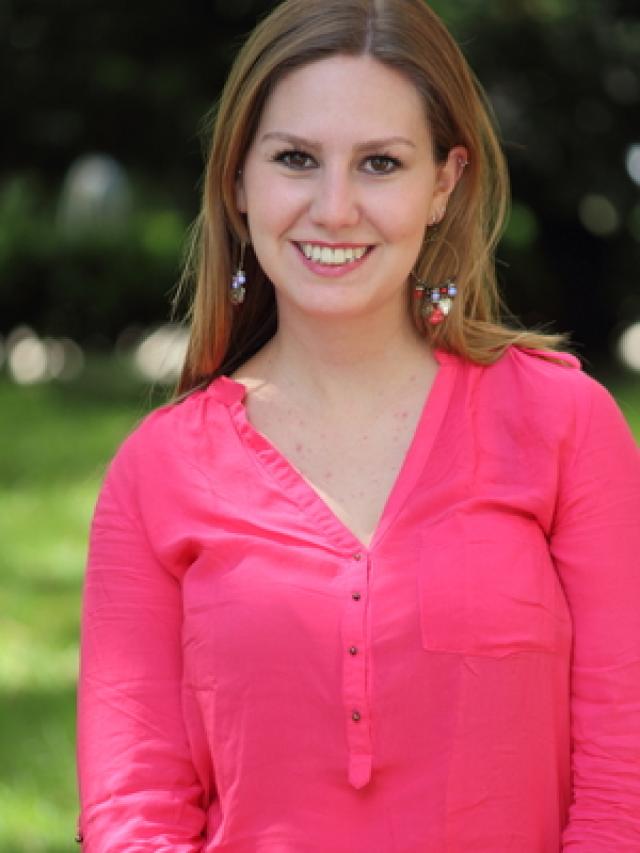
The Women's Place celebrates Mariana Miguélez Gomez
The Women's Place (TWP) celebrates graduate assistant, Mariana Miguélez Gomez, on her graduation from The Ohio State University. Learn more about her and her plans moving forward.

Mariana Miguélez Gomez assisted in the success of the Advocates & Allies for Equity initiative and Leadership Initiatives for Women of Color (LIWOC) during her time at The Women's Place. She plans to use her education and experience to join a research or international development organization. Learn more about her below as we inquire about her plans moving forward.
What brought you to work at The Women’s Place?
Dr. Rachel Bowen, who was The Women's Place assistant director and a faculty member in my department (Political Science), was looking for a graduate student to collaborate in the assessment of the Advocates & Allies program. At the time, I was interested in getting more involved with gender and inclusion initiatives, so this was the perfect opportunity for me to start my journey.
Did your time at The Women’s Place influence your research? If so, in what ways?
Sure, it did! Although I was always interested in working with vulnerable groups, The Women's Place gave me the chance to work specifically with gender-oriented initiatives as well as with diverse communities and understand firsthand how important it is to study, promote, and increase equity in society. This experience really brought those connections foreword and allowed me to move in the direction of a greater focus on gendered and inclusion politics.
What was the focus of your work?
Before The Women's Place, my work was focused on the intersection of political economy, identity, and contentious politics in Latin America. In my dissertation, I study how conflict for natural resources affects ethnicity in rural Mexico. However, after my time at The Women's Place, I began incorporating other elements into my work, such as the study of the role of women in social movements.
Have you learned anything new?
I think that I learned something new every day at The Women's Place! Not only from the initiatives we were involved with but also from my awesome colleagues. I learned a tremendous amount of interpersonal and management skills and about the work of the Office of Diversity and Inclusion (ODI). Additionally, I was able to deepen my knowledge of inclusion and justice and translate these ideas into policies and practices. It is not possible to have a well-functioning society without the inclusion of women.
What are your plans after graduation?
Honestly, the first thing I want to do after this incredible, but also challenging journey, is to relax a little bit and pick up new hobbies. However, I also can't wait to put all my knowledge into practice and be part of a great team of equally motivated colleagues at a research or international development organization. I would love to meet new people and start new purposeful projects with the mission of uplifting others.
What was the most challenging part of working at The Women's Place?
The most challenging part was working at TWP in the middle of a pandemic, especially to still be able to offer activities and networking opportunities during that time. However, I think that my biggest challenge was to help design and implement the Advocates & Allies initiative's evaluation. Firstly, because it represented the culmination of a 5-year project. Secondly, the assessment had to measure two different aspects: on the one hand, the experiences of women in higher education and the workplace and on the other hand, the attitudes of men toward implicit gender bias. Lastly, based on our evaluation, we gave a series of recommendations to improve and keep expanding the program. Having such responsibility was very challenging, but I definitely learned a lot from it, and it makes me really proud and happy that we had positive results!
How did the Critical Difference Grant help your research?
The Critical Difference Grant helped fund part of the fieldwork for my dissertation. I was able to travel to Sonora, Mexico, where I conducted group and individual interviews with the Yaqui community. Interestingly, I learned that many of the ethnic movements in rural Sonora are led by indigenous women, who I had the chance to talk to and who kindly shared their stories with me. This gave me the opportunity to expand my research interests and also contemplate the role of women in social mobilization and decision-making.
The Women's Place is greatly appreciative for the time, service and work of Mariana and wishes her great success in her future endeavors. #TWPForward